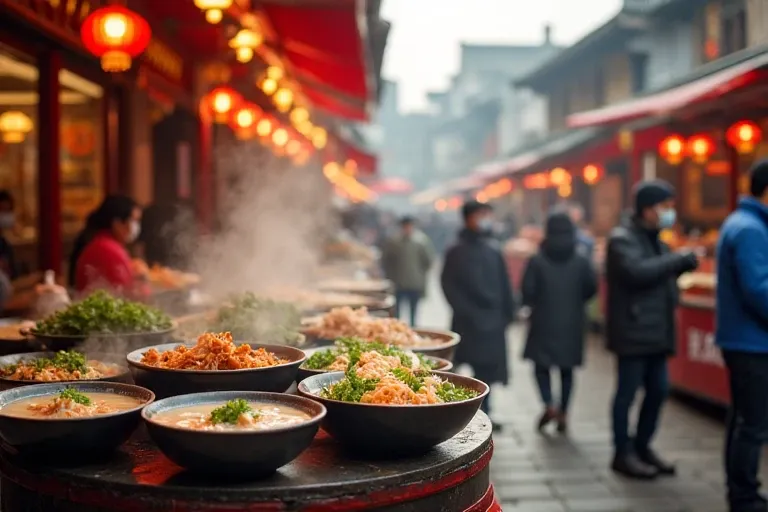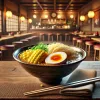Hey folks, Mark here! As a seasoned American backpacker with a penchant for exploring the hidden culinary corners of Asia, my recent trip to Dongguan, Guangdong province, proved to be an absolute revelation. My focus was Guancheng, a captivating old town steeped in history and, even more importantly, bursting with incredible, authentic food experiences. Forget the typical tourist traps; this is the genuine article – a place where you can fully immerse yourself in the rhythm of local life and taste flavors that will tantalize your taste buds and stay with you long after you’ve left. Prepare for a truly delicious and unforgettable adventure!
A Dawn of Delightful Dongguan Delights: A Breakfast Journey Unlike Any Other
My day in Guancheng started early, fueled by the anticipation of discovering traditional Dongguan breakfast delights. I dove headfirst into the historical and cultural district, my senses already tingling with excitement. My first encounter was with a humble food stall, overflowing with an array of tempting local treats, presided over by a remarkably friendly woman I believe was named Pengqi. It was here my culinary journey truly began.
Pengqi introduced me to the fascinating world of Pengqi, minuscule, square-shaped crabs affectionately known as "Prime Minister's Hands" because of their surprisingly petite size. Their delicate flavor was a delightful prelude to the refreshing cup of Imperata root and Smilax glabra tea (a mere 3 yuan!), a traditional herbal brew that proved to be the perfect palate cleanser. The subtle sweetness of the tea perfectly complemented the savory notes of the black bean cakes (2 yuan each), their slightly crisp exterior giving way to a soft, subtly sweet interior. I also indulged in some Ai dumplings, opting for the mung bean filling, whose delicate sweetness was a welcome change of pace.
Then came the truly unique experience of Salty Dog Li. This intriguing rice cake, shaped remarkably like a dog's tongue, possesses a salty, savory flavor punctuated by the delightful crunch of peanuts. The unusual name, I learned, is characteristic of many Guangdong dishes, where whimsical names are the norm. The woman explained that this wasn't unusual; names like "wife cake" and "clay pot rice" showcase the quirky naming conventions prevalent in the region.
| Food Item | Price (Yuan) | Detailed Description |
|---|---|---|
| Pengqi (small crabs) | N/A | Minuscule, square-shaped crabs, known as "Prime Minister's Hands" due to their size. A delicate and unique flavor. |
| Imperata root/Smilax tea | 3 | A traditional herbal tea, offering a refreshing and subtly sweet flavor profile. The perfect palate cleanser after savoring savory dishes. |
| Black bean cakes | 2 | Small cakes featuring a slightly crisp exterior that gives way to a soft, subtly sweet interior. A perfect balance of textures and flavors. |
| Ai dumplings | N/A | Dumplings filled with either mung bean or black bean, offering a sweet and savory experience. I chose the mung bean filling for its lighter, sweeter taste. |
| Salty Dog Li | N/A | A unique rice cake shaped like a dog's tongue, with a distinctive salty flavor and a satisfyingly crunchy peanut filling. The name is quite quirky, reflecting regional naming conventions. |
Beyond Breakfast: An Immersive Street Food Exploration of Guancheng's Hidden Alleys
My culinary adventure extended far beyond breakfast, leading me down Guancheng's captivating network of alleyways. Each turn revealed new surprises, a symphony of sights, sounds, and smells. The air hummed with the energy of local life – the rhythmic whirring of sewing machines from home-based garment factories, the comforting aroma of drying tobacco leaves, and the vibrant colors of clothing draped across clotheslines.
I stumbled upon a vendor selling four-eyed fish balls (5 yuan a string), their tender texture and subtle coriander flavor a testament to Dongguan's culinary artistry. The fish balls, surprisingly plump and yielding, were a delightful snack, their simple yet satisfying flavor a highlight of my culinary journey.
Then came the unexpected discovery of Imperata Root Porridge. This intriguing porridge, featuring the root of Imperata cylindrica (also known as cogon grass), is apparently a specialty of Dongguan. The friendly lady boss patiently explained its traditional medicinal use, highlighting its properties in clearing heat and detoxification. The porridge itself was a revelation – a delightful blend of sweet and salty flavors, studded with chopped bean curd sticks, ginkgo nuts, and polygonatum odoratum.
A Traditional Dongguan Lunch: Rice Noodle Rolls, Wonton Noodles, and a Culinary Revelation
My quest for authentic Dongguan cuisine led me to a humble, family-run eatery specializing in rice noodle rolls and wonton noodles. The atmosphere was simple yet deeply inviting – a true testament to Dongguan’s culinary heart. The rice noodle rolls, a staple of Cantonese cuisine, were surprisingly simple but intensely flavorful. The addition of meat and egg elevated the dish to new heights, showcasing the magic of simple, quality ingredients. The homemade chili sauce, a fiery concoction of yellow bell peppers and millet chilies, added a delightful kick that perfectly complemented the noodles' delicate flavor.
The standout, however, was the Imperata Root Porridge, a perfect complement to the rice noodle rolls, and a true testament to Dongguan's culinary identity. The subtle sweetness, complemented by a slight salty tang, was utterly unforgettable.
My wonton noodle experience was equally compelling. The noodles themselves were made using a traditional lever machine, a culinary feat in itself, emphasizing the importance of handcrafted techniques in this regional cuisine. The wonton soup was remarkably fresh, the delicate wontons exhibiting a subtle sweetness. The addition of duck eggs to the bamboo noodles added a pleasing crunch, enhancing the overall culinary experience.
Beyond the Food: Guancheng’s Historical and Cultural Tapestry
My exploration of Guancheng wasn't limited to the culinary sphere. I ventured into the historical heart of the old town, visiting the remarkable Quejin Pavilion, a Ming Dynasty structure with a rich history. The story behind its construction, a testament to the local magistrate's dedication to fair trade, was a poignant reminder of the town's enduring spirit.
My search for tofu pudding proved unsuccessful—the shops I initially located were unfortunately closed. This unexpected detour led me to explore the maze-like alleyways further, stumbling upon another traditional restaurant, where I relished the opportunity to savor authentic clay pot rice and Dongguan salty noodles.
The clay pot rice, with its medley of catfish, greens, sausage, and meat pie, was a symphony of flavors and textures. The salty noodles, though initially surprising with their rough texture, were utterly delightful, demonstrating the regional culinary preference for a coarser noodle, a welcome change of pace for a noodle-lover like myself. The soup, fresh and savory, complemented the unique noodle texture perfectly.
The final chapter of my day unfolded in Guangming Market, a vibrant showcase of local life and commerce. The simplicity of a 3-yuan supermarket and the charm of the old Guangming Bookstore (where I picked up a copy of "Zhiyin" magazine) truly captured the essence of this remarkable place.
A Culinary Farewell: A Must-Visit for Any Traveler
My Dongguan adventure ended with a full belly and a heart brimming with unforgettable memories. The diverse array of dishes I tasted – each a testament to Dongguan's rich culinary heritage – left me profoundly impressed. If you're planning a trip to Dongguan, make sure to include these iconic culinary experiences:
- Huaxing Roast Goose Restaurant: Known for its exceptional roast goose, a true culinary highlight.
- Guanqun Daojiao Porridge: Specializing in unique Daojiao meatballs, a must-try for adventurous eaters.
Guancheng Old Town isn't just a place to visit; it's an experience to be savored – a place where history, culture, and extraordinarily delicious food intertwine to create an unforgettable adventure. I highly recommend a visit for anyone seeking an authentic and deeply rewarding cultural and culinary journey.







